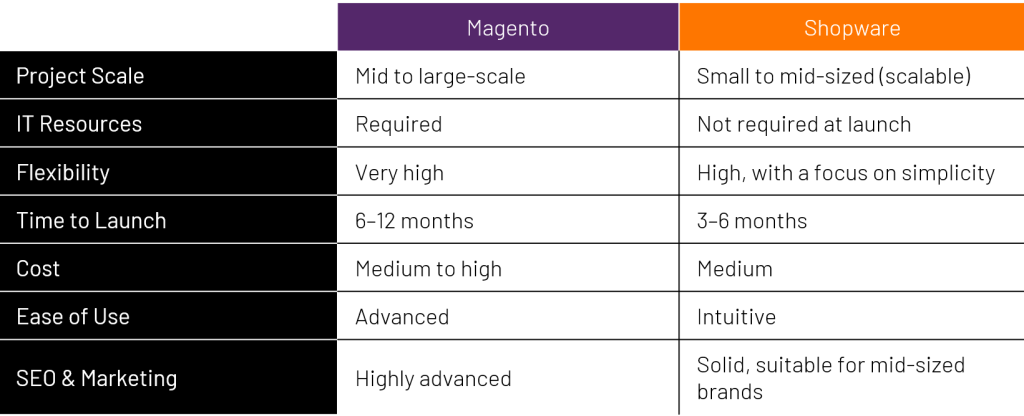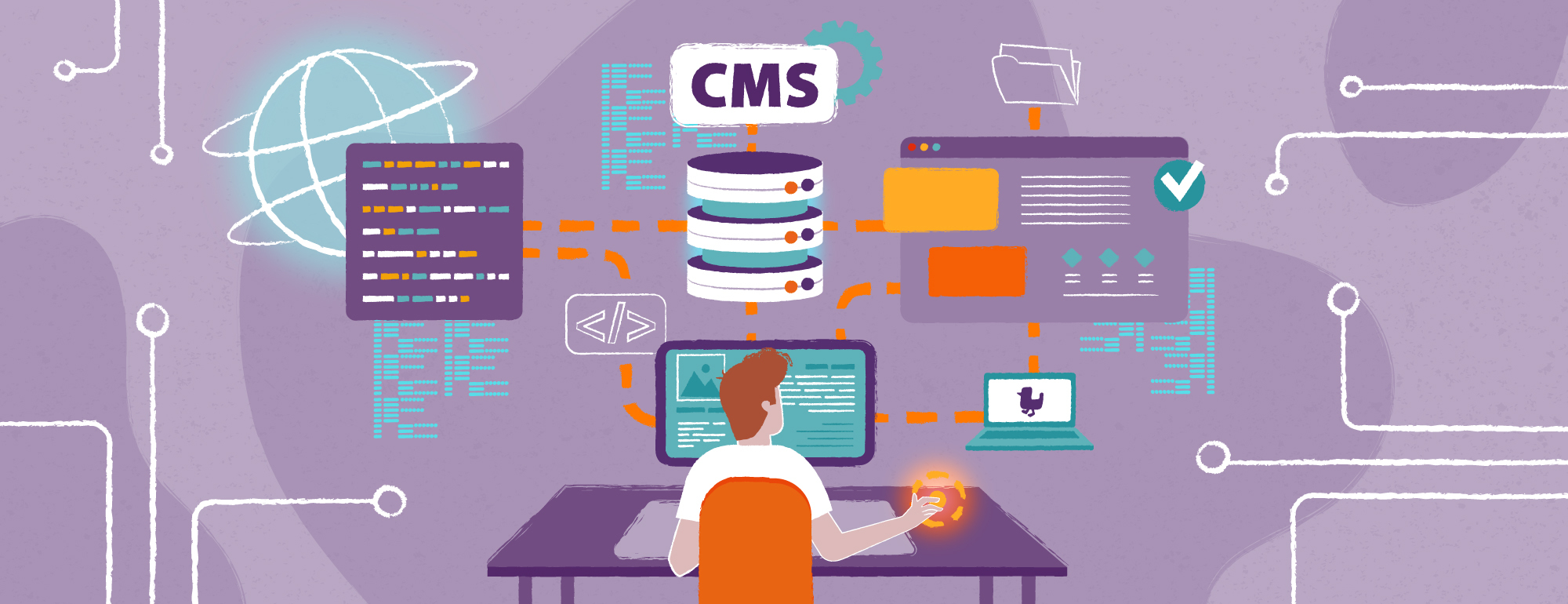Shopware vs. Magento – Which E-commerce Platform is Right for Mid-Sized and Large Projects?
Choosing the right e-commerce technology is one of the most strategic decisions when planning and scaling an online store. The right platform can not only drive sales but also accelerate time-to-market, reduce operational costs, and streamline business growth. In this article, we compare two popular yet fundamentally different platforms: Magento (Open Source and Adobe Commerce) and Shopware 6. Both offer robust capabilities and a modern approach to digital commerce, but each has unique strengths. Let’s explore which one may be the better fit for your business.
Magento or Shopware: Who Are They For?
Magento and Shopware are both well-established platforms used across B2C and B2B projects. They’re suitable for retail, wholesale, and omnichannel businesses.
Magento is a strong choice for:
- Mid-sized and enterprise-level e-commerce projects
- Businesses operating in multiple markets (multi-language and multi-currency support)
- Companies that need full control over their sales processes
- Organizations with in-house IT teams or budgets for Magento-certified partners
- Brands requiring advanced B2B capabilities and multistore operations
Shopware, on the other hand, is often selected by:
- Growing mid-sized e-commerce businesses
- Premium brands focused on storytelling and visual identity
- Teams looking to launch quickly without heavy IT involvement
- Omnichannel businesses (online store + marketplace + POS)
Architecture & Flexibility
Magento is known for its near-limitless customization options. Full access to source code allows for deep modifications across all system functions.
Magento highlights:
- Supports multistore, multi-region, and multiple sales models from a single admin panel
- Offers thousands of ready-to-use extensions via Magento Marketplace
- Enables B2C and B2B commerce, as well as marketplace integrations
- Comes with a built-in Page Builder for drag-and-drop content editing
- Ready for headless commerce and PWA implementations
Shopware is built on a modern API-first architecture and Symfony framework. It offers:
- A visual drag-and-drop CMS without the need for coding
- A powerful Rule Builder to manage promotions, cart logic, payments, and shipping without developer input
- Headless and PWA-ready capabilities
- Full support for both B2C and B2B models
- Easy integration with major e-commerce services and platforms
Performance & Scalability
Magento:
- Handles large-scale implementations with ease
- Manages millions of products and thousands of concurrent users
- Offers advanced caching mechanisms (Varnish, Redis, Full Page Cache)
- Requires strong infrastructure and code optimization for peak performance
Shopware:
- Performs well for mid-sized and larger catalogs
- Runs efficiently out of the box thanks to lightweight architecture and caching (HTTP Cache, Redis, Varnish)
- May require optimization for very large catalogs (500k+ SKUs)
Ease of Use & Store Management
Magento:
- Provides a feature-rich admin panel for advanced users
- Includes Page Builder for visual content editing
- Offers powerful configuration options, but has a steeper learning curve
- Supports centralized management of multiple storefronts
Shopware:
- Delivers a modern, intuitive UI designed for ease of use
- Enables quick drag-and-drop editing with its block-based CMS
- Simplifies product and content management
- Ideal for teams without deep technical backgrounds
Cost of Implementation & Maintenance
Magento:
- License: Open Source – Free, Adobe Commerce – from $22,000/year
- Implementation Cost: High – Developer involvement required
- Maintenance Costs: Medium to high
Shopware:
- License: Community Edition – Free, Rise, Evolve, Beyond – from €600/month
- Implementation Cost: Lower – Faster time-to-market with fewer development hours
- Maintenance Costs: Medium

SEO & Marketing Features
Magento:
- Full control over URLs, meta tags, sitemaps, and rich snippets
- Supports PWA for better Google rankings
- Includes advanced customer segmentation and personalization
- Seamlessly integrates with Google Ads, Facebook Ads, CRM systems, and marketing automation tools
Shopware:
- Solid SEO features (friendly URLs, meta tags, structured data)
- Built-in CMS ideal for content marketing
- Rule Builder simplifies campaign and promotion setup
- Easy integration with popular analytics and advertising platforms
Side-by-Side Comparison
Magento:
- Project Scale: Mid to large-scale
- IT Resources: Required
- Flexibility: Very high
- Time to Launch: 6–12 months
- Cost: Medium to high
- Ease of Use: Advanced
- SEO & Marketing: Highly advanced
Shopware:
- Project Scale: Small to mid-sized (scalable)
- IT Resources: Not required at launch
- Flexibility: High, with a focus on simplicity
- Time to Launch: 3–6 months
- Cost: Medium
- Ease of Use: Intuitive
- SEO & Marketing: Solid, suitable for mid-sized brands

Which Platform Should You Choose?
Magento is the right fit if you’re planning:
- A complex, custom e-commerce platform
- Advanced B2B or B2C features
- Multi-country, multi-language global commerce
- And you have internal IT capabilities or a budget for specialized partners
Shopware is a great option if:
- You want a quick and efficient launch
- You’re aiming for an elegant and user-friendly experience
- You prefer streamlined store management without heavy technical overhead
Need Help Choosing the Right E-commerce Platform?
If you’re exploring new e-commerce technologies, the most important first step is a conversation with experts. Our team has extensive experience analyzing business needs across industries and recommending the best-fit technology based on your goals.
We work with a range of platforms and are technology-agnostic — we’ll recommend the solution that fits your business, not ours. Whether you’re launching a simple B2C shop or building a complex B2B ecosystem, we’ll help you map out the most effective path forward.
Let’s talk — and find the right solution to power your e-commerce growth.







